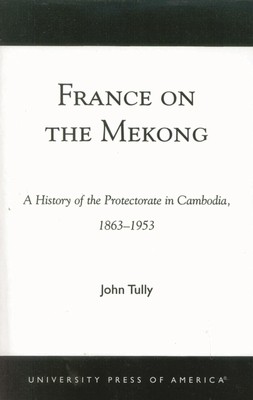
- We will send in 10–14 business days.
- Author: John A Tully
- Publisher: University Press of America
- ISBN-10: 0761824316
- ISBN-13: 9780761824312
- Format: 14 x 21.6 x 3.1 cm, softcover
- Language: English
- SAVE -10% with code: EXTRA
Reviews
Description
Based on largely unexploited archival sources, France on the Mekong is the first comprehensive history of the colonial era in Cambodia. The book takes as its point of departure Marx's early appraisal of colonialism's "double mission" in Asia. Tully argues that King Norodom's decision to invite in the French in 1863 was a "Faustian bargain" for Cambodia. While the Protectorate did ensure the continued existence of the Cambodian state, and did much to preserve Cambodia's crumbling cultural legacy, the downside was that authoritarian rule was entrenched rather than weakened, and that the country was left seriously underdeveloped when the French left in 1953. Colonialism disturbed the foundations of traditional society, but did not replace them. This was to have disastrous consequences for post-colonial Cambodia- a point that the author develops at the end of the book.
EXTRA 10 % discount with code: EXTRA
The promotion ends in 17d.17:18:23
The discount code is valid when purchasing from 10 €. Discounts do not stack.
- Author: John A Tully
- Publisher: University Press of America
- ISBN-10: 0761824316
- ISBN-13: 9780761824312
- Format: 14 x 21.6 x 3.1 cm, softcover
- Language: English English
Based on largely unexploited archival sources, France on the Mekong is the first comprehensive history of the colonial era in Cambodia. The book takes as its point of departure Marx's early appraisal of colonialism's "double mission" in Asia. Tully argues that King Norodom's decision to invite in the French in 1863 was a "Faustian bargain" for Cambodia. While the Protectorate did ensure the continued existence of the Cambodian state, and did much to preserve Cambodia's crumbling cultural legacy, the downside was that authoritarian rule was entrenched rather than weakened, and that the country was left seriously underdeveloped when the French left in 1953. Colonialism disturbed the foundations of traditional society, but did not replace them. This was to have disastrous consequences for post-colonial Cambodia- a point that the author develops at the end of the book.


Reviews